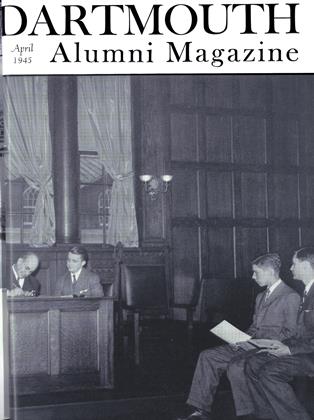Turning from the perennially interesting topic of the Hamlet-like (to be or not to be) Ivy League to winter sports, we have another interesting contribution from the Director. Those of our readers who follow the sports pages with reasonable assiduity will not have to be reminded that this winter something besides that tree grew in Brooklyn. This rank growth was a fullfledged basketball scandal which practically blew the sport right out of Madison Square Garden into the middle of Eighth Avenue. But let Bill tell it:
"Well, it seems that there were a couple of fellows who heard a thousand dollar bill bounce on the floor and it made a bigger bang than the old college try—or the Frog's Chorus from Aristophanes translated into the Brooklyn vernacular. It was a shocking performance and we like to think that the brewer's big horses can't run over us. And yet there, but by the grace of God, goes a couple of grand. There is no question that basketball has grown tremendously in public interest in recent years. The staging of spectacles in the Madison Square and other Gardens is related to this, but we are not absolutely sure of what is cause and what effect. It may be true, as averred, that the closing of race tracks has turned a lot of evil money to basketball, but there was book-making on basketball, and even on football, before the tracks were closed. We agree with the current contention that colleges should refuse to give information to publishers of dope sheets—usually called "statistical services"—and should prevent the transmission of dressing room chatter to alien ears, but we, along with our favorite opposite numbers, had been giving these gentry the Frigidaire treatment years before some of the more pious brethren were conscious of their existence. There is, it seems to us, some muddy thinking on the subject, and a confusion of betting at games with betting on games. In view of the history of the sport, we do not feel that the banning of Garden games, and the limiting of basketball to college courts —which are often cramped, ill-adapted for both players and spectators and, sometimes, covered with coal dust—is a fair, adequate, or pertinent solution.
"A few weeks ago Dartmouth played Cornell in Hanover before 415 spectators. The game, originally scheduled for a Saturday evening, was shifted to the afternoon when Cornell started to plan its season and discovered that their team couldn't get back to Ithaca within Navy regulations unless it left White River by 6:45 Saturday evening. We don't know what odds were quoted, but Cornell beat us handily and apparently a lot of smart boys with ticker tapes moved in on a lot of dull boys with stogies about the time the Ithacans were munching their victory banquet in White River, and put their clean money up against the dirty stogie money for ten points or better on the Red. By the time we signed off the long distance phone business on Sunday night, we had heard from Syracuse, Newark, Chicago, New York and Philadelphia—all asking when was the game played and how come. The point to all this is that the game was played between nice boys (Dartmouth) and fairly nice boys (Cornell), under presumably clean management, and practically in camera—yet the money was on it.
"We didn't throw the game, nor many baskets, and, as a general rule, we play most of our games in all sports 'on campus.' Perhaps it was a mistake for the colleges ever to take basketball to the Gardens, or football to large stadia. But we would hate to think that any of our games were unattractive to the collegiate and non-collegiate public. The very bigness of football, and, to a lesser extent, basketball and hockey, is inextricably twined into its influence for good as well as for bad. And more, we believe for good, in its relationship to the emotional being of the College. If athletics were endowed, and if there needed to be no interest whatever in the gate, we would still want to win our share, or better, of the games, and we would want a lot of people to watch us doing it."
With that we thank Mr. McCarter, both for his good sense and for the felicitous way in which he passes it on to us. And now we may turn to such items of sports interest as have peeped their heads shyly up through the snow in wistful pursuit of the hounds of spring.
 View Full Issue
View Full Issue
More From This Issue
-
 Article
ArticleRADIO WAVES AND RADAR
April 1945 By GORDON FERRIE HULL JR. '33, -
 Lettter from the Editor
Lettter from the Editor'Round the Girdled Earth
April 1945 By H. F. W. -
 Article
ArticleLaureled Sons of Dartmouth
April 1945 By H. F. W. -
 Class Notes
Class Notes1918
April 1945 By ERNEST H. EARLEY, DONALD L. BARR -
 Class Notes
Class Notes1945
April 1945 By ARTHUR NICHOLS -
 Article
ArticleMedical School
April 1945
Feancis E. Merrill '26
Sports
-
 Sports
SportsTRACK
MARCH, 1928 -
 Sports
SportsKIERNAN PUNTS 78 YARDS
November 1935 By C. E. W. '30 -
 Sports
SportsFIELD GOAL WINS OPENER
November 1943 By Dick Gilman '45 -
 Sports
SportsFRESHMAN FOOTBALL
December 1947 By Francis E. Merrill '26 -
 Sports
SportsSWIMMING
April 1948 By FRANCIS E. MERRILL '26 -
 Sports
SportsBaseball: good and looking better
June • 1985 By Jim Kenyon




